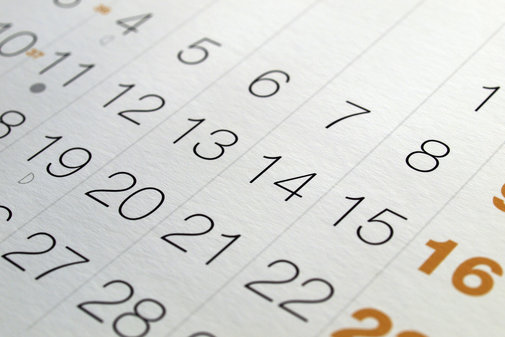
Aims:
- To revise the words for days and months.
- To teach pupils the ordinal numbers we use for the date.
- To identify dates on an English calendar.
- To practise listening comprehension of days/dates.
Materials:
- A calendar for January 2022. You can download a copy of January 2022 from the Enchanted Learning website
- An enlarged copy to stick on the board, together with a small copy for each pupil
- Word cards for days and months
- A birthday card
- Word cards for the first six ordinal numbers, i.e. 1st and first, 2nd and second, 3rd and third, 4th and fourth, 5th and fifth, 6th and sixth
- A chart showing these numbers: 1st, 2nd, 3rd, 4th, 21st, 22nd, 23rd, 24th, 31st
- Blutak or magnets
- A list of true/false statements about the month of January
Revision of months
- Show the class the birthday card, sing 'Happy Birthday to you' and elicit answers to the question 'When is your birthday?' The children may answer with the name of the month, or they may produce a full sentence: 'My birthday's in March.'
- Put the word cards for the first six months of the year on the board in jumbled order and ask for volunteers to come and reorder the months.
Introducing ordinal numbers
- Introduce the ordinal numbers using the flash cards. Say 'first' and show the flashcard with 1st. Use choral and individual repetition.
- Say 'January is the first month in the year' and get one of the pupils to come and stick the card next to January. Continue in the same way with the other word cards.
- Remove all the cards and hand out the months to one group of six pupils and the ordinals to a second group of six. Ask one of the pupils with a month card to read out his or her month and the pupil with the matching ordinal to hold up his or her card. Continue with the other months. You can repeat this activity until all the children in the group have had a chance to participate.
Understanding dates and finding them on a calendar
- Hand out photocopies of the calendar from January and stick an enlarged copy on the board.
- Point to the day's date which is usually written on the board and ask 'What's the date today?' This may be part of your class ritual, in which case it will obviously be easier for your pupils. Point to the appropriate square on the calendar.
- Ask 'Can you find the 9th of January?' All the children will be able to point to the appropriate square on their calendar, and you can ask a volunteer to come to the board and point to the correct square on the enlarged version.
- Try to make this a pupil-led activity as quickly as possible. Ask for volunteers to suggest a date that the class has to find on their copy of the calendar. The pupil who suggested the date can indicate the correct answer using the board calendar.
Matching days and dates
- Check that the students remember the seven days in the week.
- Explain that you are going to do a 'True/False' activity. Point to a calendar square on your enlarged version and say '14th January is a Wednesday. Yes or No?' Encourage the pupils to check on their calendar and call out the correct answer.
- If a quiet activity is required at this stage of the lesson, you can ask the pupils to raise both arms for 'Yes' and cross their arms for 'No.'
- After you have given five or six statements as examples, you can ask for volunteers to take over from you. Alternatively, you can set this up as a pair work activity, asking the pupils to make three statements each.
Examples of 'True/False' statements:
- '2nd January is a Friday.'
- '15th January is a Thursday.'
- '27th January is a Monday.'
At this stage, pupils will probably have difficulty with first, second, third, twenty-first, twenty-second, twenty-third, thirty-first. Correct any errors as they are made, and display these forms on the board in a chart.
| 1st | 21st, 31st |
| 2nd | 22nd |
| 3rd | 23rd |
| 4th | 24th |
Writing the date
- Point to today's date on your enlarged version of the calendar for January and write the date on the board, e.g. 'Monday 10th January.'
- Point to another date on the calendar and ask the pupils to write the date on their whiteboard or in their notebook. Go round and monitor. If writing the date in English has not been part of the class ritual, you can introduce it, letting the pupils take turns to write the date on the board.
This will give your pupils the opportunity to practise responding to 'Whose turn is it to write the date on the board?' and asking 'Can I write the date on the board please?'
Follow-up
At the beginning of a new month, ask the class to say who has a birthday during that month. The pupils can be encouraged to give the date of their family's birthday, allowing them to review family vocabulary together with the use of the possessive 's. 'My mother's birthday is on 8th April.' 'My brother's birthday is on 2nd June.'